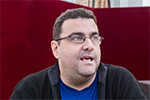


ChessBase 17 - Mega package - Edition 2024
It is the program of choice for anyone who loves the game and wants to know more about it. Start your personal success story with ChessBase and enjoy the game even more.

Andrés Rodriguez
Albert Silver – You’re the organizer of the 7th Continental Chess Tournament. How did the event come to be here in Mar del Plata, Argentina?
Andrés Rodriguez – First, I’d like to clarify we are a team managing the event, though as the organizer, my partner is Mario Petrucci, the tournament director. As to the event, about a year and a half ago, FIDE America approached us in Buenos Aires, having heard good things about events we had organized, and asked us to consider organizing an important event from the FIDE calendar.

Tournament director Mario Petrucci, his daughter Ivana Petrucci, GM Andrés Rodriguez,
and the rest of the team that made the 7th Continental smooth sailing for the participants.
From the get-go, we were forced to ignore a number of events simply because they would have required working through the Argentine Chess Federation, requiring their permission to hold the event in Argentina. The possibility therefore came to hold a tournament from the world championship cycle, which is the only one that FIDE can bestow to a private organizer without needing to go through a national federation.
Would there be any issues working with the Argentine Chess Federation? Your explanation infers that working with them would be problematic.
It is more than problematic, it is impossible. Though it is not the only Latin American federation in this situation, the Argentine Chess Federation has more or less become embodied by a single person, whose goal is to get something from chess, as opposed to giving something to it. It is pretty much all negatives and no positives. If you request help for something that might improve a tournament you never get anything, however they are always pressuring you to pay them something. It needn’t be like this though. The Uruguayan Chess Federation used to be like this, but in the last 3-4 years since IM Roselli took over the presidency, the difference is night and day. Now, the federation fulfills its purpose and obligations. If you present a chess project to the federation, the first reply is always a yes, what can we do to help? If I present the same project to the Argentine Federation the first reply will be, “What’s in it for us?”, and this isn’t the way we want to work.
Why Mar del Plata as opposed to Buenos Aires or some other city?
Obviously with Buenos Aires, the capital, we would have had more players in the tournament, however we are working in collaboration with the Sports Secretary of the Buenos Aires province (NdT: not to be confused with the city, which is located in it), and all the main sporting events it helps organize take place in Mar del Plata. Naturally, we do not discard Buenos Aires city by any means, and perhaps a future event will take place here such as the 2014 Continental or the Latin Cup.

I noticed a large number of foreigners in the tournament, meaning not from Argentina. While this might seem normal in such an event, it is rare to see so many due to the travel costs these events can incur, especially for a tournament such as this, which is eleven rounds and lasts ten days.
There is no question that the cost is considerably higher for foreigners, compounded by the length of the tournament. Time is money after all. I drew from my experience as a player. Over the years, playing in opens, round-robins, and a variety of others, I noticed a serious disparity in the number of players from one event to the next, despite similar conditions, notably prize-money. Some would be packed with players, and others would be deserted. I constantly asked myself why that was. I concluded there were two reasons. The first is simply a matter of dates. Sometimes an event can find itself competing with another and things can go sour. The second aspect is far more important though. A player coming from abroad must feel certain that the tournament will be well-organized. There is nothing worse than flying 5000 kilometers to an event and realize after you arrived that it is a mess. I think this was our greatest asset. Our extensive experience organizing events in Vila Martelli, which goes back to 1994 when we organized our first major open, helped a lot. If I send a letter or email to someone regarding an event, they almost always already know me or know of me, and this reassures players that they can program themselves even months in advance with no worry. In chess this is quite rare, and most players will wait until the last minute in case the tournament is canceled or postponed, since all too often an event’s organization is chaos. This is especially important to the non-professional aficionados who travel with their spouse or family, and need to be able to count on a stress-free environment, programming themselves months in advance. To summarize, the key is trust.
What does the future hold?
Three facets always dominate my life: training, organizing, and playing. As an organizer, my dream is to organize an elite grandmaster tournament that remains a fixture in the calendar. This year we came a little closer when we organized an eight player tournament with Shirov in the roster. Still, with this blossoming collaboration with FIDE, further events will assuredly follow.
Thank you and best of luck.